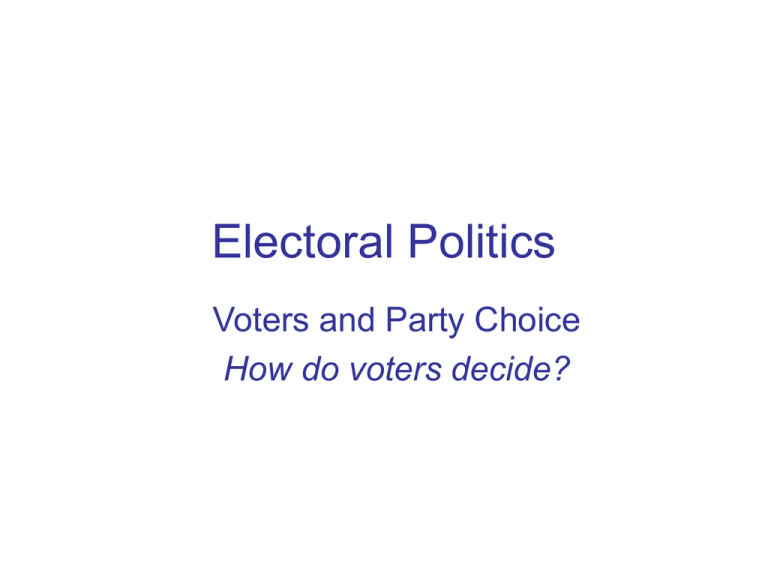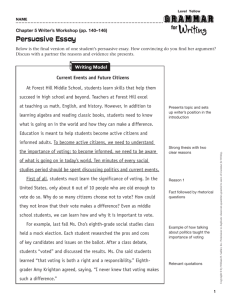Electoral Politics
advertisement

Electoral Politics Voters and Party Choice How do voters decide? ‘Attitudes and Electoral Behaviour’ Dalton, 2006 • Electoral conflict ultimately revolves around the issues and candidates of the campaign. • They represent the dynamic aspect of electoral politics. • As the electoral impact of long-term partisan attachments decreases, there is a corresponding increase in the influence of issue opinions on voting choice. (Franklin, Mackie and Valen, 1992) • There has been a rise in candidate-centred choices in America, and greater role of candidate images. (Wattenberg, 1992) Principles of Issue Voting • • • • • • • • Linked to political sophistication of the electorate. Theoretically, issue voting is defining feature of a sophisticated, rational electorate. In reality, sceptics have seen voters as lacking knowledge, voting on the basis of ill-informed/incorrect beliefs. Empirical studies criticize the electorate’s ability to make informed decisions. Campbell et al, 1960: 3 requirements for meaningful issue voting: – Citizen should be interested in issue. – Should hold opinion on issue. – Should know the party or candidate positions on the issue. Voters fail to meet these criteria; 1/3rd or less possible issue voters. Key, 1966: citizens are moved by concern about central and relevant questions of public policy, government performance, executive personality. Issue publics - groups of people interested in a specific issue. Type of Issue Time Frame Position Performance Retrospective Policy Appraisal Performance Evaluation Attribute Attribute Voting Prospective Policy Mandate Anticipatory Judgement Position Issues and the Vote • Increased levels of policy-based voting in modern party systems. • Advanced industrialism has not meant end of policy differences within societies: role of economics on voting behaviour. • Issue controversies are born from changing focus of political concern: foreign policy, nuclear energy, women’s rights, environmental protection. • Can provide a general measure of impact of policy preferences on voting behaviour by examining relationship between Left/Right attitudes and vote. Traditional economic issues of Old Politics • • Support for social services, government measures to lessen income inequality, manage economy display strong relationship with voting preferences. Large issues publics and political parties have clear policy positions on government’s role in economy. New Politics Issues • • • Environment Gender Foreign Policy Performance Issues and the Vote • Performance based voting offers voters a shortcut for ensuring that unsuccessful policies are dropped and successful policies continued. • Importance of macroeconomics on micropolitics. • State of the economy can be so important in some elections that it overrides other policy considerations. Candidate Images and the Vote • Some consider voting on basis of personality characteristics as ‘irrational’. • “Candidate assessments actually concentrate on instrumental concerns about how a candidate would conduct governmental affairs.” • US in lead of candidate-centered electoral politics. • Parliamentary systems invoke less impact of candidate image on voting patterns, however impact is rising. • French have long valued the importance of string political leader, institutionalised in the directly elected presidency. Citizen Politics and Voting Behaviour • • • • • • • Decline in long-term determinants of voting choice. Influence of social class on voting preferences has declined, as has impact of religion, residence and other social characteristics. Dealignment has decreased effect of party attachments on voting decisions. This has been counterbalanced by a growth in short-term attitudes: issue opinions and candidate images. Modern electorate more politically sophisticated and interested, greater availability of political information, allows people to reach their own voting decisions. Changing impact of economy on the vote. New style of citizen politics is characterised by a greater diversity of voting patterns. This represents a major departure from the structured partisan politics of the past. ‘Voting: Choice, Conditioning and Constraint’ Miller and Niemi Short-Term Factors • Unpredictable events • Changes of leaders • Candidate effects • Campaign effects • New and salient issues Conditioning • Media • Sociogeographic context Constraints • Number and nature of Available options • Impact of electoral system on voters’ choice: – Tactical voting and demobilisation undxer majoritarian systems. – Ticket-splitting in multiple vote systems – Dual party identities in multi-level systems.


